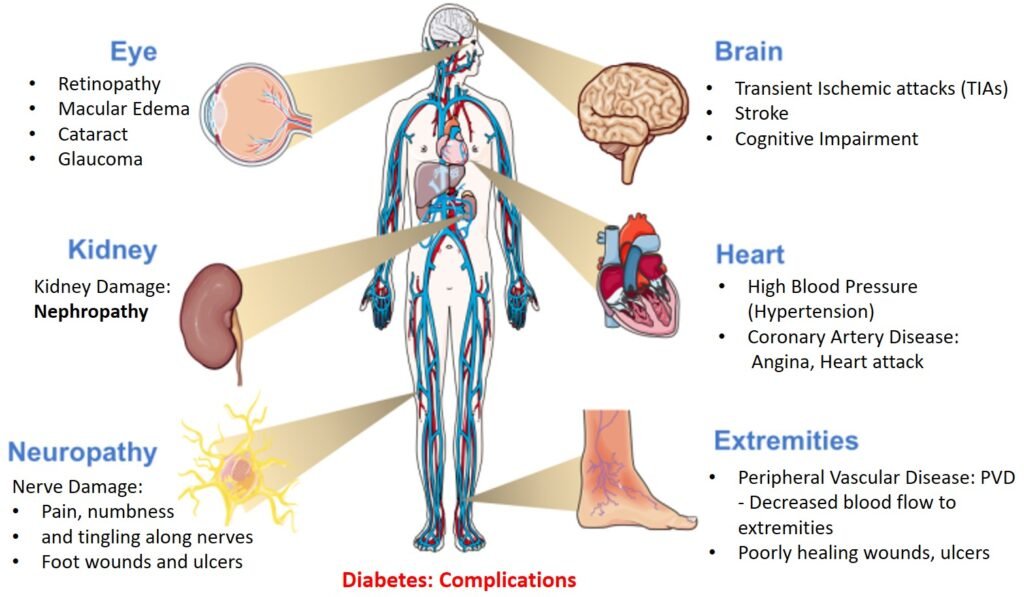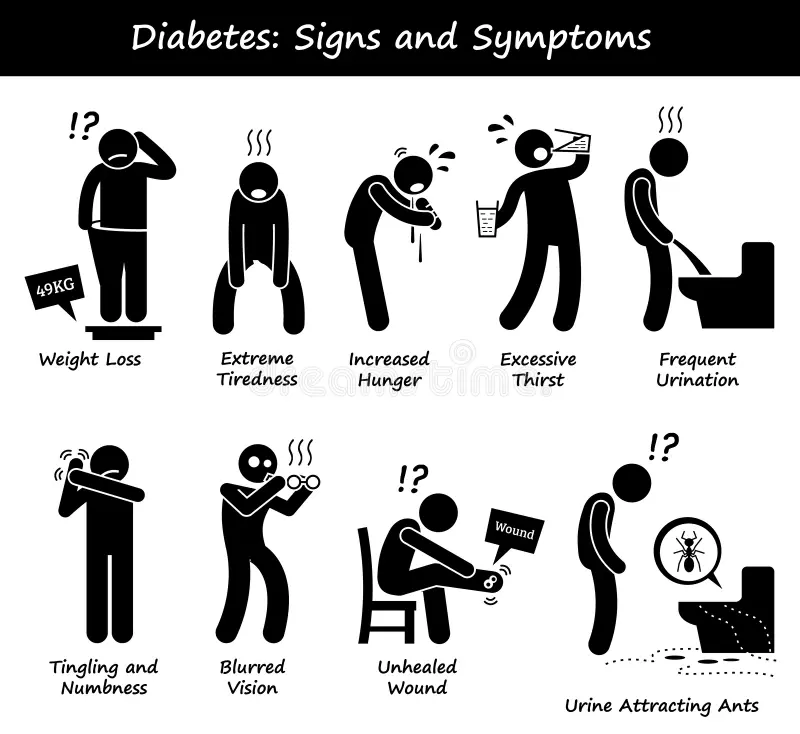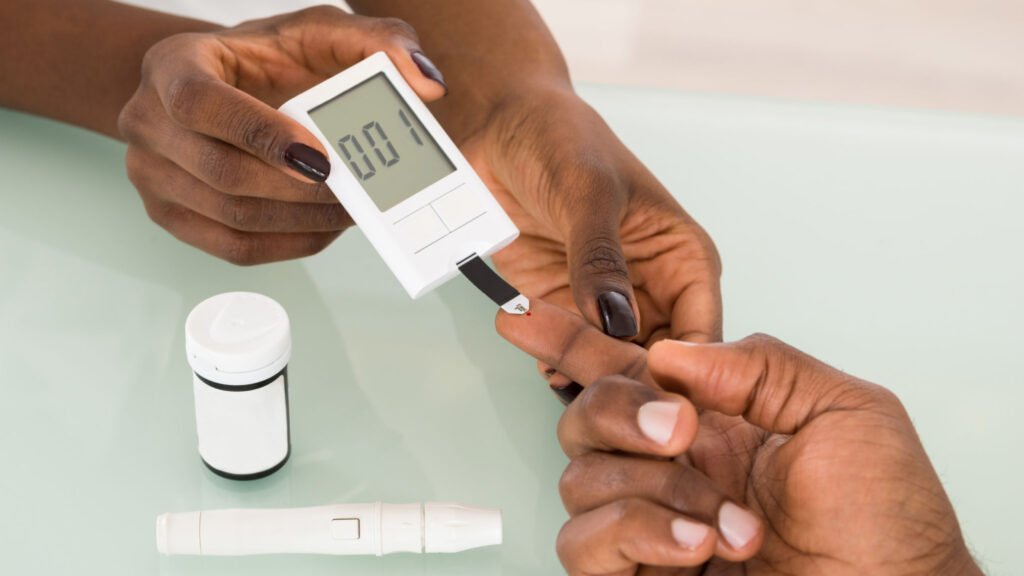
What is diabetes?
Diabetes is a chronic medical condition that occurs when your blood sugar (glucose) levels are too high. Glucose is a key energy source for your body, but high levels can cause health problems if not managed. Insulin, a hormone produced by the pancreas, helps regulate blood sugar. In diabetes, the body either doesn’t produce enough insulin or can’t use insulin properly, leading to elevated blood sugar levels over time.
There are three main types of diabetes:
- Type 1 Diabetes: The body’s immune system attacks insulin-producing cells in the pancreas, leading to an insulin deficiency. It often starts in childhood or early adulthood and requires lifelong insulin therapy.
- Type 2 Diabetes: The most common form, where the body becomes resistant to insulin or doesn’t produce enough insulin. It’s often linked to lifestyle factors like poor diet, lack of exercise, and obesity.
- Gestational Diabetes: Occurs during pregnancy and usually disappears after delivery but increases the risk of developing type 2 diabetes later in life.
Why is diabetes a concern?
Because diabetes can lead to serious health complications if not properly managed. These include:
- Heart Disease and Stroke: People with diabetes are more likely to develop cardiovascular diseases.
- Kidney Disease: High blood sugar can damage the kidneys, leading to kidney failure over time.
- Nerve Damage: Prolonged high blood sugar can damage nerves, particularly in the feet, leading to diabetic neuropathy. This can result in pain, numbness, and even foot ulcers.
- Eye Damage: Diabetes can affect the eyes and lead to diabetic retinopathy, which can cause blindness if not treated.
- Amputations: Poor circulation and nerve damage can lead to foot infections that may require amputation if not managed effectively.
The many damaging effects of diabetes on the body

What causes diabetes?
Diabetes occurs due to a combination of genetic and lifestyle factors:
- Type 1 Diabetes: It is believed to be triggered by an autoimmune reaction where the body’s immune system attacks insulin-producing cells. The exact cause is still unknown, but genetics and environmental factors may play a role.
- Type 2 Diabetes: Often associated with being overweight, physically inactive, and having poor eating habits. Genetics also play a role, but the condition can be managed or even prevented by adopting a healthy lifestyle.
- Gestational Diabetes: Hormonal changes during pregnancy can lead to insulin resistance. Women who are overweight or have a family history of diabetes are at higher risk.
Symptoms of diabetes
The symptoms of diabetes can vary depending on the type and the individual, but common signs include:
- Increased thirst and hunger
- Frequent urination
- Fatigue and weakness
- Unexplained weight loss (more common in type 1 diabetes)
- Blurred vision
- Slow healing of wounds
- Numbness or tingling in hands or feet (particularly in type 2 diabetes)

How is diabetes diagnosed
A blood test is required to diagnose diabetes. Some common tests include:
- Fasting Blood Sugar Test: Measures blood sugar levels after fasting for at least eight hours.
- Oral Glucose Tolerance Test: Blood sugar is tested before and after drinking a sugary liquid to see how the body processes sugar.
- A1C Test: A blood test that reflects your average blood sugar levels over the past two to three months.
Managing and living with diabetes
While there is no cure for diabetes, it can be managed adequately through lifestyle changes, medication, and regular monitoring. Key steps in the management of diabetes include:
- Monitoring Blood Sugar Levels: Regularly checking your blood sugar helps ensure it stays within a healthy range.
- Healthy Eating: A balanced diet that includes whole grains, lean proteins, fruits, and vegetables can help control blood sugar.
- Exercise: Physical activity helps your body use insulin more efficiently and lowers blood sugar levels. Aim for at least 30 minutes of moderate exercise most days of the week.
- Medications: People with type 1 diabetes need insulin therapy, while those with type 2 diabetes may require oral medications or insulin.
- Stress Management: High levels of stress can raise blood sugar, so finding ways to manage stress—like meditation, relaxation techniques, or hobbies—can help.
- Quit Smoking: Smoking increases the risk of complications, especially heart disease.
- Regular Checkups: Routine visits to your healthcare provider are essential for monitoring and adjusting treatment.
Two examples of a healty diet for diabetic patients


Preventing diabetes (Type 2 and gestational diabetes)
Type 2 and gestational diabetes are largely preventable. Here are the actions you can take to lower your risk:
Actions that Apply to Both Type 2 and Gestational Diabetes:
-
Maintain a Healthy Diet: Choose balanced meals rich in whole grains, vegetables, fruits, lean proteins, and healthy fats. Limit refined sugars and processed foods.
-
Regular Physical Activity: Aim for at least 30 minutes of moderate exercise most days of the week. Regular physical activity helps improve insulin sensitivity and maintains healthy weight levels.
-
Maintain a Healthy Weight: Keeping a healthy weight reduces the risk of insulin resistance, a common factor in both types. Even a modest weight loss (5-10%) can significantly lower the risk.
-
Regular Blood Sugar Monitoring (If at Risk): For those at higher risk (family history, overweight, or prior history of gestational diabetes), regular blood sugar checks can help detect any early signs of diabetes.
-
Limit Sugary Beverages and Junk Food: Cutting back on sugary drinks and highly processed foods reduces your overall risk of diabetes by helping regulate blood sugar.
- Maintain a Healthy Weight: Losing 5-7% of your body weight can significantly lower your risk if you’re overweight.
- Stay Active: Regular exercise, like walking, swimming, or cycling, improves your insulin sensitivity.
- Eat Well: Choose foods high in fiber, like vegetables, fruits, and whole grains, and avoid processed foods high in sugar and unhealthy fats.
- Limit Sugary Beverages: Opt for water or unsweetened drinks instead of sodas and sugary juices.
Actions Specific to Preventing Type 2 Diabetes:
-
Quit Smoking: Smoking increases insulin resistance, a major cause of Type 2 diabetes. Quitting can lower your risk significantly.
-
Focus on Fiber-Rich Foods: A diet rich in soluble fiber (found in oats, beans, and fruits) helps regulate blood sugar and keeps you feeling full longer, reducing overeating.
-
Manage Stress Levels: Chronic stress can increase cortisol levels, leading to higher blood sugar. Stress management techniques, such as meditation, yoga, or deep breathing, are crucial in prevention.
Actions Specific to Preventing Gestational Diabetes:
-
Start Healthy Habits Before Pregnancy: Women planning to conceive should aim to reach a healthy weight and establish healthy eating and exercise habits before pregnancy, as this can help prevent gestational diabetes.
-
Follow a Gestational-Friendly Diet: During pregnancy, it’s important to consume nutrient-dense foods and avoid excessive intake of refined carbohydrates. Consult a healthcare provider for personalized advice during pregnancy.
-
Attend Regular Prenatal Check-Ups: Early detection of high blood sugar through regular prenatal care helps manage risks. Screening for gestational diabetes is usually done between weeks 24-28 of pregnancy.
How to support someone with diabetes
For carers and family members, understanding diabetes is crucial to providing support. Here are some key ways to help:
- Encourage healthy habits: Help the person with diabetes follow a balanced diet, stay active, and manage their blood sugar.
- Learn as much as you can about diabetes: Understanding the condition can help you provide better support, especially in emergencies like hypoglycemia (low blood sugar), which often occurs suddenly.
- Be involved: Attend medical appointments with them, help with meal planning, or join them in physical activities.
- Be patient and positive: Diabetes management can be challenging, so offer encouragement and understanding rather than criticism.
The importance of education and awareness
Raising awareness about diabetes is vital, especially in regions like sub-Saharan Africa, where the condition is on the rise due to changing lifestyles.
By promoting early detection, prevention, and better management, communities can reduce the burden of diabetes-related complications.
Health education campaigns targeting both diabetic patients and the general public are critical to improving outcomes.
Remember
Diabetes is a manageable condition, but it requires ongoing effort and attention.
Through lifestyle changes, regular monitoring, and proper medical care, people with diabetes can lead healthy and fulfilling lives.
Education, awareness, and support are key to managing this condition and preventing its complications.
Whether you are living with diabetes or caring for someone who is, understanding the condition is the first step towards better health.


